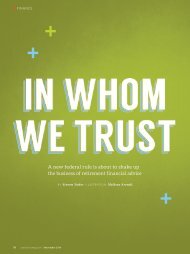Finance
Create successful ePaper yourself
Turn your PDF publications into a flip-book with our unique Google optimized e-Paper software.
• FINANCE<br />
For a sense of how fungible the label “financial<br />
adviser” has become, talk to Mike Chamberlain<br />
of Chamberlain Financial Planning & Wealth<br />
Management, which has an office in Sacramento.<br />
“'Financial services industry' is a very broad<br />
term,” he says, “and I don’t like being included in it.<br />
It’s embarrassing — if I tell someone I’m a financial<br />
adviser they immediately start to duck, thinking that<br />
I’m trying to sell them something.”<br />
Consider the alphabet soup of titles that adorn those<br />
counseling people on their financial futures. They include Accredited<br />
Financial Counselor (AFC), Accredited Investment<br />
Fiduciary (AIF), Asset Protection Planner (APP) and Accredited<br />
Asset Management Specialist (AAMS). Those are just the<br />
A’s — the Financial Industry Regulatory Authority counts 167<br />
such acronyms in all.<br />
And a title doesn’t necessarily connote expertise. Some<br />
designations have real teeth. Among other requirements, a<br />
Certified Financial Planner (CFP) has to have advanced education<br />
in finance (like a Ph.D. in business or economics) and do 30<br />
hours of continuing education every two years. Others, like Behavioral<br />
Financial adviser (BFA), just need to take two 2-month<br />
courses from a particular for-profit college and pass an exam.<br />
Soon all planners who give retirement investment advice<br />
will have to adopt an additional designation, one that won’t<br />
appear behind their name: fiduciary. That means they’ll be legally<br />
bound to act in their clients’ best interest, not their own.<br />
A U.S. Department of Labor rule set to kick in next April will<br />
require retirement advisers to meet the fiduciary standard.<br />
Chamberlain already operates as an accredited investment<br />
fiduciary — his fees don’t waver depending on which<br />
investment he recommends. That’s not true of many in the<br />
industry, who earn commissions based on selling specific<br />
products, some of them high-cost.<br />
For fee-only advisers like Chamberlain, the effects will be<br />
few. For other local financial planners who work on retirement<br />
accounts, the change may well mean retooling how they make<br />
money, and some may not survive. The rule applies only to retirement<br />
accounts because only these accounts, such as 401(k)s and<br />
IRAs, are under the DOL’s purview. The agency doesn’t regulate<br />
regular investment accounts. Those are the province of the U.S.<br />
Securities and Exchange Commission, which so far hasn’t required<br />
all who give financial advice to operate as fiduciaries.<br />
$17 BILLION IN HIDDEN FEES<br />
Financial advisers get compensated in a range of ways, but<br />
the two big ones are fee-only and commission. Typically,<br />
those who earn fees charge a flat retainer that doesn’t change<br />
with the advice they give, a fee that’s a percentage of their<br />
client’s assets under management or an hourly rate. Those<br />
72 comstocksmag.com | November 2016





